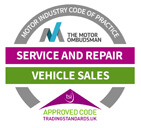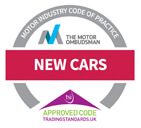The used car market in the UK is absolutely huge. Across 2019, just shy of 8 million used vehicles were bought and sold – and even amid a universally tight-fisted lockdown period that has seen most of our car usage plummet massively, over a million used cars changed hands in the second quarter of 2020.
Here at Robins & Day, we certainly understand the importance of the market, with our extensive used car range representing a significant portion of our sales through the year. We also understand the importance of quality within the used car market – indeed, when most people come to us to buy a used car, their absolute priority is getting value for money and a reliable motor that will do the job asked of it.
If you’re considering an upgrade soon, you’re likely wondering exactly how to buy a used car. What should you look for? Where should you go? How can you ensure you get a good deal? It’s not an exact science, but our guide will give you all the pointers you need on how to buy a great used car.
Why buy a used car over a new car?
Perhaps the first thing to ask is why used cars are so popular. You’ve probably guessed the answer – it’s all about money. With hundreds, thousands or even tens of thousands of pounds involved, a car purchase represents a very considerable outlay for the average person, so it makes sense you want to get the best value, and in turn save as much money as possible, when buying. The disparity between the cost of a brand-new car and its value even one year down the line is striking, thanks to the rather stunning effects of depreciation in the car market.
Any new or recently registered car buyer should be fully aware of depreciation statistics before they make a purchase. Buy a new car, and it’ll lose 15% of its value the moment it’s driven off the showroom floor. After a year, it could lose up to 35% of its initial sale value, and after three years it’ll typically be worth half what it once was. So, is it worth buying a new car or used? There’s no doubt buying used gives you the chance to get a lot more car for your money, which for most is worth the trade off against receiving a second-hand product.
What to look for when buying a used car
If you’ve made the decision to go for a used option, there a number of fundamental elements to consider as you begin your search. Here’s what you should be looking for.
- Running costs: It’s safe to assume that if you’re buying used, value for money is important to you. So, don’t let that stop at upfront cost. Consider a car’s cost to run once you’ve bought it, including its on-road economy, insurance premium and maintenance costs.
- A reliable brand: The big question mark with buying used is whether you’re getting a reliable car. The best place to start with that is by choosing a reliable, trusted brand and model. Think the Vauxhall Corsa, Peugeot 208, Citroen C1 and similar company.
- Timing: When is the best time to buy a used car? Typically, that would be at the end of a quarter (end of March, June, September or December) when dealers are looking to hit sales targets. Right now, amid lockdown and COVID life, however, one could argue that deals are readily available from people and dealers struggling to make sales.
- The best deal: With so many sellers out there, make sure you’re shopping around to find the best deal available, and don’t be afraid to use deals you’ve found elsewhere as leverage when negotiating a price.
- Your essential requirements: While you’re looking for a cracking deal, don’t lose sight of what your essential requirements are in your new car, whether that’s a certain amount of space or a level of economy. Don’t buy a car that won’t do the job you need it to.
- A reliable seller: Just as with finding a reliable brand to increase your chances of finding a good car, finding a reliable seller will also help, but more on that below.

What to do when buying a used car: Should I buy a used car from a dealer or a private seller?
You have two distinct options when buying used – you can buy from individual sellers privately or head to a dealership. Both have their pros and cons.
Why buy a used car from a dealer?
We’ve already discussed reliability as a paramount factor when buying used. In a world where vague and dishonest private sellers most definitely exist, your best bet is with a dealer. Head to your local Robins & Day dealer and you’ll find a number of testing and warranty assurances attached to your purchase, not to mention our desire to maintain our reputation as a seller of top-quality used vehicles.
You’ll also find accessible financing options available with most dealers, meaning you can break down your purchase into manageable payments rather than hand over a lump sum of cash as you would privately.
Why buy a used car from a private seller?
The biggest advantage to buying privately is undoubtedly the chance to get a better price. This can be because of a number of reasons. You might be able to haggle them down more, they might be looking for a quick sale or they might just not quite know the value of what they’re selling. Furthermore, they don’t have margins and targets to worry about like a dealer, which can play a part in pricing.
If you find an honest seller, you can likely also find out more about the car you’re buying beyond the documentation provided. Someone who has owned and driven the car can tell you the ins and outs of the vehicle history, what makes it tick and what doesn’t.
That is the big “if”, though, and the biggest conundrum most buyers face in the private vs dealer debate. Recent data suggests that lately buyers have favoured reliability over best price, with dealerships accounting for 59.2% of all used car sales between February 2018 and February 2019.
What to check when buying a used car
So, you’ve found a car you’re interested in, now comes the time to run through all the worst-case scenarios in your head. Here’s what to check when buying a used car, particularly if you’re buying from a private individual (but still definitely so if you’re buying from a dealer):
- Mileage: Check the mileage on the car makes sense in relation to its age. Most cars do around 10,000 miles a year, so if the figure on show is way outside of this one way or the other, it’s worth asking questions.
- Body work: Check the panelling for an evidence of bumps and scrapes that haven’t been declared, as well as areas that have been mentioned as being in an accident where applicable.
- Check any repairs: Take a look at any work done on the car to see if it’s of proper quality e.g. no gapping between the body work.
- Check the oil level is correct.
- Check the engine: Lift up the bonnet and check the engine and surrounding parts for any signs of leakage or malfunction.
- Test the lights: check the headlamps, brake lights and indicators.
- Check the tyres for tread level and inflation.
- Check the interior electrics: Make sure the radio and other internal features of the car are in working order.
- Take a test drive: Always take a test drive. If the seller isn’t keen to offer one, it’s worth querying. Knowing what to ask when buying a used car could help you avoid a costly mistake.
- The price: Used cars are there to be negotiated on. You might not have too much luck at a dealer (although there’s no harm in asking), but private sellers are often open to be a little flexible.
- Your gut: Don’t ignore your gut feeling. If something doesn’t look or feel right, don’t be afraid to walk away.
The buying process of a used car is no time to be shy. After all, we’re talking about a key purchase worth a lot of money. Go into any negotiation confident, resolute and with a critical eye.
How do I protect myself when buying a used car?
Beyond the assurances a dealership might provide you, it’s a little tough to protect yourself when buying a used car, especially with an individual seller who may want to pull the wool over your eyes. There are a few tips to remember.
- Pay something toward the car on a credit card where possible. A Section 75 deposit makes the credit company as liable as the dealer for the car should things go wrong.
- Keep a copy of the original seller description of the car. This way you have some proof of being mis-sold a product if the car isn’t as advertised.
- See the car at the seller’s home. When buying privately, alarm bells should be going off in your head if the seller doesn’t want to meet you at their home.
The question of how to buy a used car that is reliable and good value for money is unfortunately one that doesn’t have an exact answer. However, if you follow the steps in our guide on what to look for when buying a used car, you’ll give yourself the best chance of getting the bargain deal you hoped for.


 Find us
Find us
 Contact Us
Contact Us


 My account
My account













